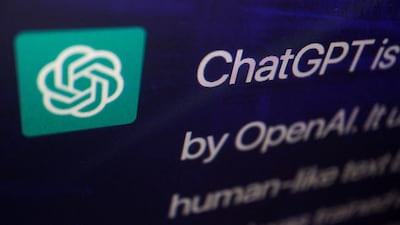Microsoft-backed OpenAI has created quite a disruption with its generative artificial intelligence platform ChatGPT, triggering a new race in the technology world.
That has resulted in several more platforms being launched, as developers aim to tap into the potential of the emerging technology, which is poised to reshape interactions in business and society as we know it.

In the several months that generative AI has been in the mainstream, it has impressed users and is providing a boost to the lagging semiconductor industry, while also giving rise to concerns and controversies, and being deemed 2023's most overhyped emerging technology.
Here, we take a look at some of the most notable generative AI platforms today.
ChatGPT: the one that started it all
The platform that began the craze.
ChatGPT was launched in November last year and became a sensation because of its advanced conversational capabilities. It has been widely considered the gold standard that other platforms are trying to match or surpass.

In January, a study from UBS showed that ChatGPT had amassed 100 million users two months after its launch, which made it the fastest-growing consumer app in history – until it was passed last month by Meta's Threads, a rival to X, which hit that milestone in five days, according to data from Sensor Tower.
However, its growth has stalled: global traffic on ChatGPT declined nearly 10 per cent in June, the first month it posted a drop, after growth began to level out in May, according to a report by internet analytics firm Similarweb.
That prompted OpenAI to introduce ChatGPT Enterprise this week, a new paid business tier that comes with more premium features as the San Francisco-based company seeks to boost revenue and address a decline in user growth.
Google Bard: ChatGPT's first rival
ChatGPT was launched in November 2022 and was the talk of the AI town for about three months until Google launched Bard in February.
The platform from the Alphabet-owned company aims to create innovative ways to engage with information, from language and images to videos and audio, using the information from the web – which Google specialises in – to offer new, high-quality responses.
Bard, however, caused a kerfuffle a couple of days after its launch when it made an error during a promotional video, wiping out about $100 billion from Google's market capitalisation.
Since then, it has been smooth sailing: Bard has expanded to 46 languages in 238 countries and territories, as Google redoubles its commitment to generative AI by integrating more tools on its user-focused platforms.
Microsoft Bing Chat: an 'AI co-pilot' for the web
Bing Chat, Microsoft's own entry based on OpenAI's GPT-4 foundation model, is what you would expect: it is optimised to deliver better search, more complete answers, a new chat experience and the ability to generate content.
Microsoft thinks that it is good enough to handle the unanswered search queries on Bing – which is about half of an estimated 10 billion on a daily basis.
However, in February, more than a week after it was launched, Bing Chat generated more than that: it turned testy and even disturbing during interactions, because it essentially mimicked what it learnt from online conversations, analysts and academics said at the time.
And it almost seemed that Microsoft would win a huge deal with Samsung when in April it was reported that the world's biggest manufacturer of mobile phones would use Bing as its default search engine for its devices. However, the following month, Samsung decided to stick with Google.
Code Llama: just part of Meta's stacked arsenal
Code Llama, an LLM that can use text prompts to generate and discuss code, was launched by Meta Platforms last week – free of charge. It supports many of the popular programming languages currently used by developers, such as Python, C++, Java, PHP, Typescript [JavaScript], C# and Bash.
And that is only part of the Facebook parent company's arsenal of generative AI offerings, which, among others, includes CM3leon (for text and images), AudioCraft (music) and VoiceBox (speech), which will be available through its popular apps, including Messenger, Instagram and WhatsApp.
To drive down all those points, the company is also developing its own silicon chip MTIA – Meta Training and Inference Accelerator – especially for its AI ambitions.
Character AI: the bot that 'feels alive'
Created by two former Google developers, Character AI is trying to distinguish itself by being “more humanlike”, letting users chat with celebrities, historical and fictional characters, even with more than one bot at a time. It also allows users to create their own bots.
This variation and the numerous perspectives it brings are what has made the app one of the most popular platforms behind ChatGPT.
It can also be used to translate certain languages, though the results are not 100 per cent accurate, which means users need to exercise due diligence and verify the results elsewhere.
Ernie: China's answer to ChatGPT
China's Baidu, the country's search engine equivalent of Google, on Thursday received regulatory approval to release its ChatGPT-like Ernie AI bot in the country.

Ernie – short for Enhanced Representation through Knowledge Integration – was released in March amid the ChatGPT craze and immediately gained traction, its wait-list amassing more than 30,000 corporate clients then ballooning to about 1.2 million before Baidu stopped disclosing figures.
The company is attempting to match ChatGPT, which is so far unavailable to the general public in one of the world's biggest technology markets.
Jais: 'more accurate' than other existing Arabic LLMs
Jais, which was unveiled on Wednesday, was developed by researchers from Inception, a unit of Abu Dhabi AI company G42, Mohammed bin Zayed University of Artificial Intelligence and Silicon Valley-based Cerebras Systems, and aims to bring one of the world's most widely used languages into the AI mainstream.
The developers said Jais is more accurate than other existing LLMs for Arabic. The launch of Jais is also a further step towards encouraging the scientific and computing communities to focus more on non-English LLMs, they said.
xAI: Elon Musk's answer
It comes as no surprise that the owner of X, formerly Twitter, has jumped into the generative AI fray: xAI was announced in July, with a mission statement “to understand reality” and “the true nature of the universe”.
The company has a stacked team, whose members have previously worked at DeepMind, OpenAI, Google Research, Microsoft Research, Tesla and the University of Toronto, and have “collectively contributed some of the most widely used methods in the field” of AI, its website says.
No launch date has been set for xAI, and the company is “actively recruiting experienced engineers and researchers”.


